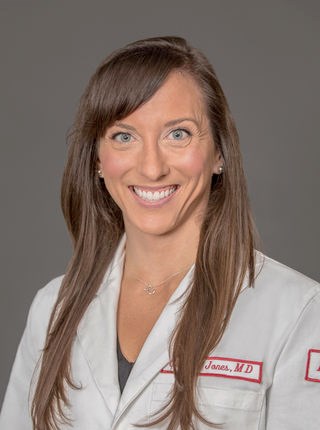Faculty Focus: Q&A with Christine M. Jones, MD

In this installment of Faculty Focus, we present ASPS member Christine M. Jones, MD, assistant professor of Surgery in the Division of Plastic and Reconstructive Surgery, Temple University Hospital and Lewis Katz School of Medicine, Philadelphia.
Dr. Jones earned her medical degree at Pennsylvania State University College of Medicine, Hershey, and completed a plastic surgery residency at Penn State Hershey Medical Center and a Fellowship in Craniofacial and Pediatric Plastic Surgery at Cincinnati Children's Hospital. Dr. Jones' clinical interests include pediatric plastic surgery, breast reconstruction, lower-extremity reconstruction/limb salvage, aesthetic surgery and noninvasive rejuvenation. Among other accolades, she's been awarded the Stryker Fellowship by Operation Smile and the Stephen H. Miller Resident Teaching Award by Penn State College of Medicine.
PSR: How did you prepare for a competitive fellowship?
Dr. Jones: Being a good resident prepares you to match into fellowship. Paying attention to detail, caring well for patients, finishing what you started and being the one to go the extra mile will stand out to your faculty and peers in any setting. When it comes time to match into fellowship and apply for jobs, the recommendations from those who know you go farther than almost anything else.
PSR: What impact did the fellowship have on your career?
Dr. Jones: Fellowship provided the foundation for advancing as a craniofacial surgeon. In my fellowship, we did all types of craniofacial and pediatric plastic surgery – cleft, craniosynostosis, orthognathic, microtia and microsurgery. This breadth of training provided me with a wide skillset that served me well in the job search and into my current practice.
PSR: How important is a mentor – and how can we find one?
Dr. Jones: Finding a mentor you trust and with whom you relate well is one of the most important things a resident can do during training. Ideally, this will be someone with whom you can identify on a personal as well as a professional level. Good mentors are lifelong colleagues; you will find yourself reaching out to your mentor for advice well into your career. Most residents are assigned a mentor early in training. This is a helpful start, but you should also assess your own goals, needs and personal attributes, and compare them with what you see each of your faculty members modeling. Look for someone with whom you relate on as many levels as possible. In some cases, having more than one mentor can be beneficial – especially if they can each lead you in a specific area.
PSR: What's the most important quality in a resident?
Dr. Jones: Integrity. Integrity is doing the right thing when no one else is watching. Make good decisions with the little things, and the big things will take care of themselves. No one is perfect, and it takes integrity to admit when you've made a mistake or you don't know the answer. Integrity leads to trust – and trust builds teams and relationships.
PSR: How do you balance your professional and personal lives?
Dr. Jones: An honest and accurate understanding of yourself is the basis of achieving balance. What is it that only you can truly do? Prioritize these things. For my daughter, I'm the only one who can be mom. It's important for me to be there for quality time and her special moments. What you chose to do, do it well. Be present in each commitment you accept; this means avoiding overscheduling yourself. Make time for self-care – read a book, go for a walk, go to the gym. I like to get up early in the morning to read, then start my day from a refreshed perspective.
PSR: What was your greatest non-medical challenge of training?
Dr. Jones: I had a family member who was ill during the first several years of residency. When he was hospitalized, I would go to visit him post-call. Our family lived about an hour-and-a-half away during residency, so having them relatively close was a source of strength.
PSR: What are some of the challenges you encounter on a regular basis?
Dr. Jones: Challenges fall into strategic versus mundane categories. The mundane are the ones with which residents are most familiar – O.R. turnover, having the right equipment for the case or managing the nonadherent patient. It's important not to get too weighed-down with this, though. Focusing on the strategic challenges – where do you want your career to go, what are areas of potential growth, what opportunities are around the corner – keeps your career fresh and your perspective marketable.
PSR: What advice do you have for plastic surgery residents?
Dr. Jones: Try to soak up every experience like a sponge. You naturally focus on operative detail, which is important. Look for other opportunities, as well. Go to clinic; learn what operation to do and when; learn what a normal, postoperative course looks like. Compare how your attendings do things. Look at how your mentors build professional relationships and build programmatic systems. These are the things you may miss if you aren't paying attention in residency.
PSR: Complete this sentence: "I knew I wanted to become a plastic surgeon when..."
Dr. Jones: I saw the many ways we can restore hope in people's lives. We have opportunities to interact with people at critical moments and turn their lives to the better.